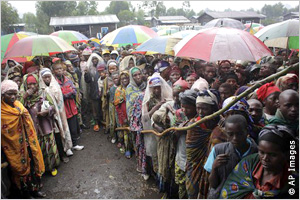Washington — The international community has a “moral imperative” to act more effectively to break the cycle of death and suffering in the Democratic Republic of the Congo (DRC), according to U.S. Assistant Secretary of State for African Affairs Johnnie Carson.
“No other conflict or act of violence since World War II has come close to taking so many lives” as in the DRC, Carson said in Washington February 11.
Carson said a sophisticated, internationally backed solution, similar to what was done to stabilize the former Yugoslavia and end the civil war between Sudan and South Sudan, “is the only way forward.”
He said the first step is for the DRC, Rwanda, Uganda and other countries in the region to sign a United Nations Framework Agreement on the deployment of a joint U.N. and African Union force in the DRC. Then, a comprehensive peace process needs to be launched, involving local communities, especially in the Kivu region of eastern DRC, civil society groups and international organizations. He said because of the size and complexity of the challenges, a senior, high-level U.N. envoy is needed to coordinate the work.
“The United States is prepared to work with other U.N. Security Council members and our African partners to discuss how to move forward on the DRC,” Carson said. He held out no illusions about the difficulty of the work, saying that the history of the Great Lakes region of Africa has been marked by many unkept agreements.
Revising the role and strength of the current U.N. stabilization mission in the DRC, known as MONUSCO, requires immediate attention, Carson said. The mission must have the capacity and the political will to prevent a small group of rebel soldiers from taking over cities in the DRC, such as occurred in the eastern city of Goma in late 2012, he said.
“The United States strongly supports the integration of a regional intervention brigade into MONUSCO,” Carson said.
Carson said if the DRC government implements long-overdue reforms, that will encourage the international community to offer greater assistance.
“The Congolese people are courageous and resilient,” he said. “We should not miss this opportunity to build on this courage and resiliency for a brighter future for the DRC.”
Combined, the conflicts in Rwanda, Somalia, Darfur, Sudan and South Sudan killed 4.1 million people, fewer than the 5.1 million who have perished from war and disease in the DRC since 1998, according to Carson. “Let me say that again. Since 1998, more than 5 million people have died in the DRC as a result of violence,” he said.
Carson described the DRC as a “poster child” for problems that have afflicted Africa for the past 50 years: military coups, rampant corruption, anemic development, health pandemics, runaway inflation, conflict minerals and poor governance.
But to write the country off as hopeless would be a mistake, because stability and prosperity in the DRC would benefit all of Africa, with spinoff gains for the rest of the world, including the United States, Carson said. The DRC has the potential to be one of Africa’s economic and political powerhouses, given its large population, fertile soil, hydroelectric resources and abundance of precious minerals, he said.
“It could become a leading exporter of natural resources, agricultural products and scientific research that could attract substantial U.S and other foreign investment,” Carson said. He added that the DRC, with the second-largest rain forest in the world, must be a critical partner in a global effort to combat climate change and protect biodiversity.
